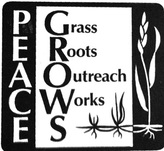Glossary of terms as defined by the Alternatives to Violence Program
| Glossary to Download | |
| File Size: | 155 kb |
| File Type: | docx |
|
ACTIVE LISTENING - DIFFUSE
Active listening: Making a conscious effort to hear, understand, and respond to what is said. Active nonviolence (Direct action): Denotes a wide range of methods of confronting conflict which do not use any violent force: examples include strikes, sit-ins, boycotts, rallies, street theatre, personal witness, letter campaigns, leafleting, etc. Affirmation: The assertion of the positive value of a person or idea. American: is used to denote any one of the following: a Native American (an ”Indian”); a citizen of any part of North, Central, or South American continents; (and/or) a United States citizen. Alternative: Situation requiring choice; offering choice Anarchism: "A doctrine advocating the abolition of government as the indispensable condition for full liberty.” (The Random House Dictionary) Anti-Semitism: Systemic and/or individual discrimination, prejudice, or persecution against Jews. Arbitration: Binding settlement of a dispute by an impartial thirdparty (an ARITRATOR), for example by a judge or jury. Assertive: Stating positively but without aggression. Boycott: To join together in refraining from dealing with or buying from. Brainstorm: To freely share suggestions, inspirations, or ideas without discussion or evaluation. Capitalism: An economic system based upon private ownership for profit of the means of production and their products. Civil disobedience: Nonviolent refusal to obey a law (intended to influence government policy). Civilian-based defense (Nonviolent national defense): Nonviolent protection (as, of a homeland) by non-military personnel, usually an entire able population. Class-ism: Systemic and/or individual prejudice against or oppression of people on the basis of their lesser wealth, education, or social status. Collective: Non-hierarchical group organization or process. Communism: The theory and economic system of collective ownership of the means of production by a local community with all members sharing in the work and the products. Compromise: The process of mutual concession to resolve differences (conflict). Conflict: Opposition of actions or ideas; a problem or disagreement. Confront: To face or meet (as, a problem); to deal with. Conscientious objector: A person who is unwilling to participate in war and/or the military for reasons of personal belief about violence. Consensus: General agreement; willingness of all members of a group to go along with a particular solution or action. Cooperative (Co-op): An association formed to help its members buy, sell, or live jointly to better mutual advantage; a communally owned and run operation. Dehumanization: The deprivation of human qualities, rights, or understanding. Democracy: Government by elected representatives of the people; a country with democratic government where all citizens have equal rights and opportunities. Diffuse: To scatter, dilute, or confuse a problem so as to make confrontation less likely and resolution impossible or postponed. |
DILEMMA STRATEGY -
NEGOTIATION Dilemma strategy: A nonviolent action strategy of creating a situation wherein the party in power has to choose between alternatives it might not consider advantageous. Setting up a dilemma for the party in power means it will be more likely to change/ negotiate with its opponent. Disarmament: Reduction in the size and/or equipment (weapons) of the armed forces. Draft: To select persons for mandatory service in the armed forces. Equitable: Fair and just, distributed on the basis of need. Escalation: An increase in the magnitude or intensity; a build up making resolution more difficult. Facilitator: A person who helps a meeting or negotiation to run smoothly and effectively; one who disencumbers group process (FACILITATES) to make way for mutually satisfying conflict resolution and action. Fascism: Totalitarian and unresponsive governmental system. Feminism: 1 : The doctrine advocating equal social, economic, and political rights for women. 2: The assertion of the importance of processes, work, and ideas traditionally considered ""feminine.” 3: Opposition to patriarchy and patriarchal forms of behavior. Genocide: The systematic and planned killing of a racial, political, or cultural group of people. Global responsibility: The feeling of obligation to be concerned with the welfare of the earth and its inhabitants, including outside national boundaries. Heterosexism: Systematic and/or individual persecution, discrimination or prejudice against homosexuals, and sometimes suspected homosexuals and bisexuals. Holocaust: 1: Any widespread destruction, especially by fire. 2: The Holocaust refers to the genocidal incarceration and murder of Jews and others by the German Nazi state, 1933-1945. Human rights (Civil rights): Just claims for equitable legal, economic, and social power in a society or country. Imaging: A technique of picturing and depicting verbally our dreams or ideas. Imperialism: The policy or practice of extending or trying to extend the dominion of a government, ideology, or nation over a widening territory. Institutional violence: The deprivation of any person or group of their basic human rights or needs, imposed or condoned by an institution or society. Institutional violence: The deprivation of any person or group of their basic human rights or needs, imposed or condoned by an institution or society. Mediation: Helping to settle differences by having someone (a MEDIATOR) go between opposing parties, negotiating with each and suggesting non-binding resolutions. Military-industrial complex: The private corporation and governmental institutions which control and equip the U.S. military: mainly the Pentagon, the Department of Defense, the Department of Energy (nuclear weapons and research), and the private contractors which operate military production plants for a profit. Negotiation: Discussion "with a view to reaching agreement" (Webster’s New World Dictionary); talking about a conflict where both parties give and take to reach a resolution. |
NEW INTERNATIONAL ECONOMIC ORDER - RAPE
New international economic order (NIEO): A United Nations study and campaign for redistribution of world resources: poor nations would be paid more for the raw material and labor they provide to wealthy nations, international loans would be reexamined so as to be less harsh on developing nations. Noncooperation: A kind of active nonviolence entailing a (usually collective) refusal to help or work together with an institution or group in power. Nongovernmental organization (NCO): A group working to resolve international problems which is not directed, paid, or sponsored by any government. Nonresistance: A conscious, usually preplanned response to violence entailing not opposing or protecting oneself. Commonly used by activists demonstrating against institutional violence as a response to physical retaliation by police or bystanders. Nonviolence: Confrontation of violence with intent not to injure and/or rectify injury or injustice. Nuclear freeze proposal: A proposal for an immediate moratorium on further production, development, or deployment of any nuclear weapons. lt has been proposed unilaterally (U.S. only), bilaterally (U.S. and U.S.S.R.), and multilaterally (all nuclear weapons producers). Ombudsman/Ombudswoman: A public official responsible for fact-finding to aid conflict resolution: s/he investigates complaints from private citizens and/or consumers, especially those involving abuses of power by government officials. Oppression: "Exists when any entity (society, institution, group or individual), intentionally or unintentionally, inequitably distributes resources, maintains inflexible or unresponsive structures, refuses to share power, and/or pursues an unclarified mission while ignoring diversity for its own supposed benefit, and rationalizes its action by blaming or ignoring the victim.” (—-Jean Alvarez) Synonym: Institutional violence. Pacifism: A belief that disputes should be settled by nonviolent means. Peace: Freedom from violence and war and the causes thereof. Peace churches: The three Christian churches, Society of Friends (Quaker), Brethren, and Mennonite, which hold pacifism at the core of their religious philosophies. Peacekeeper (once called Peace marshall): A person at a demonstration or convocation responsible for helping to resolve problems peacefully and preventing violence. Peace research: Investigation and study into the causes of and alternatives to war and other violence and into how to encourage peace and nonviolence. Perception: Become aware of through the senses; understand Pluralism: The doctrine or belief that there is more than one kind of ”correct” or "good"' person or way of life. Prejudice: Preconceived or biased, usually unfavorable, ideas about a person, group, or place. Racism: The systemic and/or individual persecution, discrimination, or prejudice against a person or group on the basis of race, specifically of persons with dark skins by people/groups with white or other-colored skins. Rape: "The crime of having sexual intercourse with a woman forcibly and without her consent.” ( Webster’s New World Dictionary); the act of a man forcing any sexual contact upon another man, woman, or child. |
ROLE PLAYING - WORLD PEACE TAX FUND BILL
Role playing: A learning technique in which two or more people act out characterizations of other people or other communication styles. Satyagraha: The Indian word for Truth-Force, or nonviolent action, coined by Mahatma Mohandas Gandhi. Security: "A feeling of being free from fear, danger, etc.” (Webster’s New World Dictionary) Sexism: Systematic and/or individual discrimination or prejudice against women; the devaluation of people, objects, and ideas considered ”feminine.” Simple living: Reducing one’s detrimental effect upon the world and its finite resources by, for example, growing own food, buying direct from producers, recycling, etc. Socialism: The theory and political-economic system of society/government ownerships of the means of production and distribution, in which all members are required to work and are paid equally. Street theatre (guerrilla theatre): A nonviolent action strategy in which a person or persons performs a skit and/or wears a costume(s) to dramatize and explain a problem or viewpoint to the public. Takes place in public places or on the street. Strike: Nonviolent refusal to continue to work until a problem is resolved. Types of strikes include the following: Hunger strike. To refuse to eat until a problem is resolved. One-hour (one day) strike. To stop work for a pre-determined length of time as a protest or warning. Sit-down strike. To occupy a workplace or other institutions while refusing to work or support it. Walk-out. To leave in the middle of a meet~ ing or workday to protest what goes on there. Wildcat strike. A strike which is illegal and/or not sanctioned by a recognized union. Work slowdown. To slow or impede, rather than stop, work. Tax resistance: Refusal to pay taxes as a form of nonviolent civil disobedience. War tax resistance, then is the refusal to pay the percentage of one’s taxes which would which would go to fund army operations(past, present, and future). This is illegal. See also World Peace Tax Fund. Town meeting (also called public meeting, open meeting): A community gathering to learn about and discuss an issue of concern. Trans-armament: The period and process of conversion from a national security system based on military force to a nonviolent, civilian-based defense system. Transnational corporation (multinational): A business which operates in more than one country (for example, mining or growing raw materials in one country, and refining and selling them in another, or shipping parts to another country to be assembled by a less-paid labor force than the home country's). Vigil: A nonviolent watch or silent demonstration to protest, honor or express concern, and sometimes to encourage others to do likewise. Violence: Force used to injure or take advantage of someone; hurt imposed. Types of violence include physical, verbal, psychological, and institutional (including oppression). World federalism: The belief in or practice of world government. World peace tax fund bill: If passed, this bill would make possible legal conscientious objection to war taxes: taxes of a conscientious objector which would have paid for war would instead go into a federally administered World Peace Tax Fund, working to end the causes of war. |

